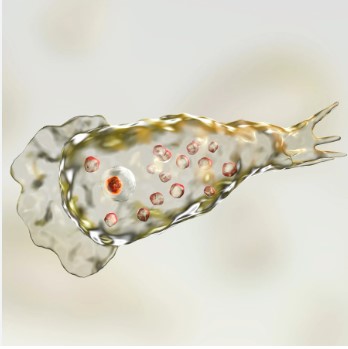Context:
Recently, A five-year-old girl in Kerala died from primary amoebic meningoencephalitis (PAM), a rare infection caused by Naegleria fowleri, also known as the “brain-eating amoeba.”
About Brain-eating amoeba:
- Naegleria fowleri, often called “brain-eating amoeba,” is a single-celled organism that can cause a serious central nervous system infection.
- People who become infected by this amoeba develop a condition called primary amoebic meningoencephalitis (PAM). PAM is a very serious infection of the central nervous system that’s almost always fatal.
Habitat:
- Naegleria fowleri thrives in warm (around 46°C or 115°F) and stagnant freshwater – like lakes, rivers, hot springs, and poorly maintained pools.
Infection:
- People can become infected when contaminated water enters the nose, typically while swimming or diving.
- The amoeba then travels up the olfactory nerve to the brain, where it destroys the brain tissue and causes swelling, causing a severe and often fatal infection called primary amoebic meningoencephalitis (PAM).
- PAM is non-communicable and people can’t get infected by drinking Naegleria fowleri contaminated water.
Symptoms:
- Early signs (within days of exposure) can be misleadingly common, including:
- Headache, Fever, Nausea, Vomiting.
- However, the infection quickly advances, leading to:
- Disorientation, Stiff neck, Seizures, Sensitivity to light (photophobia), Mental confusion, Coma.
- Fatality Rate: It’s important to note that PAM has a high fatality rate, exceeding 97% even with treatment.
Treatment:
- Early diagnosis and treatment are crucial for survival.
- Antimicrobial medications such as amphotericin B, azithromycin, fluconazole, rifampin, miltefosine, and dexamethasone can be used, but the prognosis remains poor.
Prevention:
- The best way to avoid infection is to be cautious around warm freshwater sources:
- Avoid swimming in stagnant or inadequately treated water.
- Hold your nose or use nose clips while swimming in potentially contaminated water.
- Avoid forceful activities that stir up sediment in shallow water.

